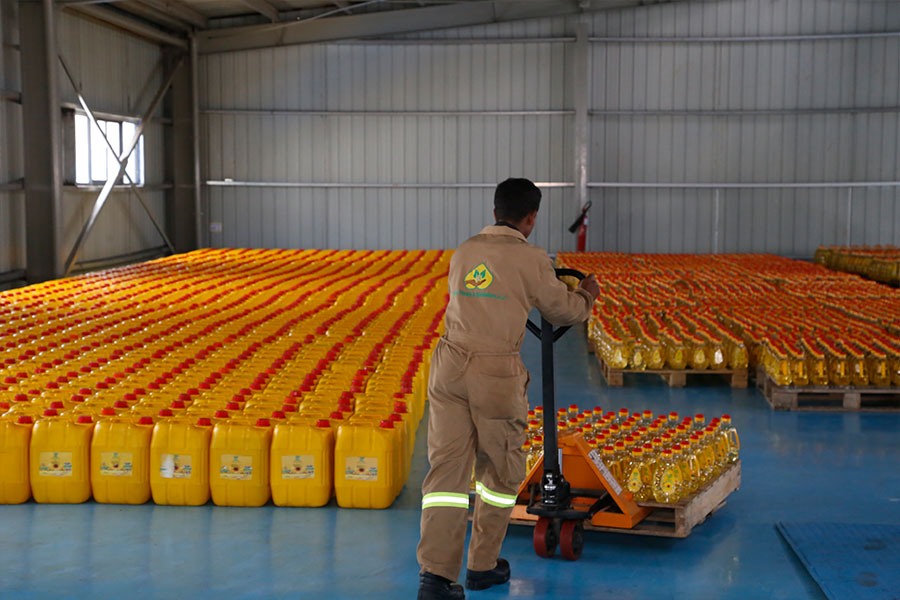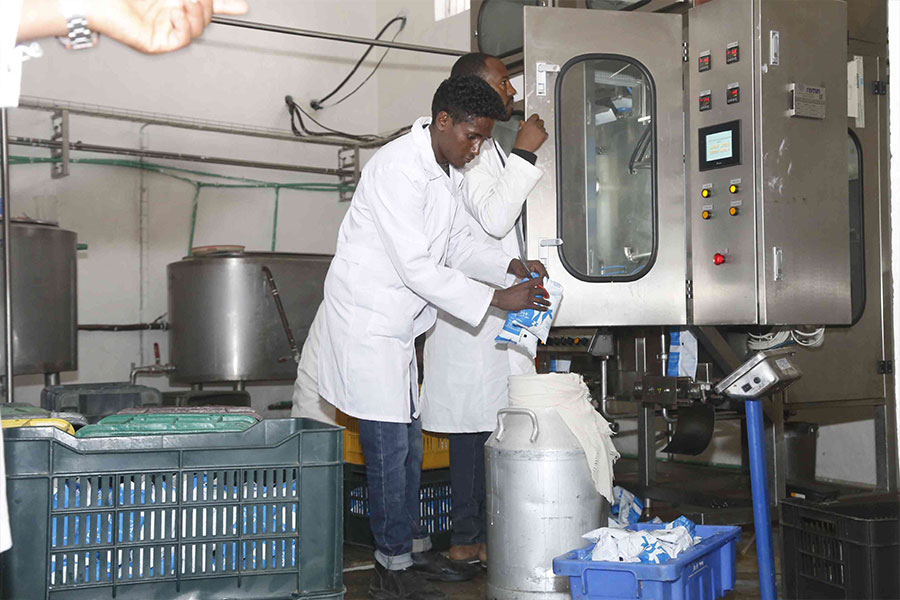
Fortune News | Aug 27,2022
In an audacious move to rejuvenate the agricultural sector, federal authorities are contemplating allowing the private sector to import fertiliser,(possibly through franco valuta) challenging the state's monopoly over a sector worth billions of dollars.
The potential transition comes as part of a broader plan, as the country grapples with securing foreign currency needed to pay for imports. In the five months beginning July last year, the federal government spent 226.3 million dollars, a whopping 134pc larger than the same period the previous year.
A multi-agency study examining the feasibility of this venture is underway. The consortium is formed of experts from diverse fields, including agriculture, finance, and logistics. Among the institutions involved are the ministries of Agriculture and Finance, the Ethiopian Agricultural Corporation, and the Ethiopian Shipping & Logistics Service. Experts see the effort as a proactive attempt to address the lingering scarcity in the market, which has been troubling the country's farmers.
"The ultimate goal is to benefit the farmer," said Melese Bedane (PhD), head of the chemical input supply desk at the Ministry of Agriculture.
While the ongoing study is broad in scope, it won't involve all 24 actors in the supply chain from import to retail, he disclosed to Fortune. Melese carefully noted that while the study is exploratory, it does not necessarily imply full privatisation of the sector. Rather, it hints at introducing "alternative options" in the forthcoming year.
The shifting agricultural landscape seems to align with Finance Minister Ahmed Shide's austere budget plans for the coming fiscal year, focusing chiefly on debt management. The Minister was emphatic about the private sector becoming the driving force of the economy, urging that the government's role should focus on creating an enabling environment while limiting its role in regulation.
The history of Ethiopia's fertiliser business traces back to half a century ago, when Ethiopia Amalgamated Ltd, significantly owned by Gebreyes Begna, was the sole player in the market. This changed during the Dergue regime, as the state-owned Agricultural Input Supply Corporation (AISCO) controlled the fertiliser market with regulated and subsidised pricing. The fertiliser was distributed primarily to state farms and "high-potential areas," while smallholder farmers often experienced scarcity.
The landscape evolved yet again in post-1991 under a revised economic policy implemented by the EPDRF government, which introduced a multichannel distribution system. Party-affiliated endowment companies such as Guna, Ambasel, Wondo and Dinsho gained prominence, and public enterprises' share dwindled. This shift lasted until 2008, when the federal government decided to limit imports to farmers' cooperatives, aiming to capitalise on bulk purchases and save foreign currency.
Under the management of Kifle Woldermariam, the state-owned Ethiopian Agricultural Business Corporation procured 12.8 million quintals of fertiliser this year, with 8.5 million quintals delivered by June. Amhara Regional State Agriculture Bureau, in particular, received 5.2 million quintals, with three million quintals delivered to the unions so far, according to data from the Bureau. It is a figure in sharp contrast with the data available for the Ministry of Agriculture.
The Bureau's Deputy Head, Ajebe Sensahew, observed a regional supply shortage despite this. Ajebe advocates for strong regulations and believes opening the sector to private businesses could provide relief.
As the rainy season approaches, apprehension is mounting among the region's farmers, who mainly farm teff and wheat on the 1.7 million hectares of land. A scarcity of supply ensued unprecedented farmers' protests in various towns, including Bahir Dar city, underscoring the urgency of the matter.
Farmers like Bezuayhu Muluye from the Enmay Wereda, who plans to harvest teff this season, have been waiting for the arrival of fertiliser at their cooperative union's gate. His concern is less about the price and more about the availability of fertilisers.
"I'm worried if I can find any at this point," he told Fortune in a desperate tone.
In anticipation of this significant sector shift, cooperative federations are lobbying for import privileges. The Oromia Agricultural Cooperatives Federation represents 40 unions and was established with 22 million Br capital. It is among those interested, after Abinet Tarekegn, the federation's general manager, recently presented a proposal to the Ministry of Agriculture. The annual imports of pesticides and herbicides worth up to 40 million dollars show that the Federation is not new to enter such business.
However, challenges persist.
Sofia Kassa, state minister for Agriculture, told Parliament that out of the 1.3 million tons of fertiliser procured by the Ministry, only 477,526tns have been delivered and distributed across the country. The forex crunch has slashed the initial plan to open 24 letters of credit in half.
Economists and experts have long advocated for private sector involvement in fertiliser imports and distribution.
Akalu Teshome, a food system transformation advisor at Wageningen University & Research Centre, in the Netherlands, believes private sector involvement could enhance imports while maintaining the Corporation's role in distribution and low pricing. However, he noted that the supply-demand imbalance continues to grow, with supply decreasing year on year while demand rises. He cautioned that this issue would not be entirely resolved until Ethiopia became self-sufficient in fertiliser production.
"Matching the distribution time with the crop calendar of specific areas will go a long way until the demand can be met," Akalu said.
With private sector involvement on the horizon, Ethiopia's fertiliser industry could be on the verge of transformation, a move that holds substantial implications for the country's farmers and its wider agricultural sector.
PUBLISHED ON
[ VOL
, NO
]

Fortune News | Aug 27,2022

Commentaries | Jul 10,2020

Obituary | Jan 28,2023

Editorial | Feb 12,2022

Life Matters | Jun 21,2025

Commentaries | May 18,2019

Fortune News | Jul 08,2023

Fortune News | Jun 05,2021

Agenda | Jun 07,2022

Radar | Oct 14,2023

Dec 22 , 2024 . By TIZITA SHEWAFERAW
Charged with transforming colossal state-owned enterprises into modern and competitiv...

Aug 18 , 2024 . By AKSAH ITALO
Although predictable Yonas Zerihun's job in the ride-hailing service is not immune to...

Jul 28 , 2024 . By TIZITA SHEWAFERAW
Unhabitual, perhaps too many, Samuel Gebreyohannes, 38, used to occasionally enjoy a couple of beers at breakfast. However, he recently swit...

Jul 13 , 2024 . By AKSAH ITALO
Investors who rely on tractors, trucks, and field vehicles for commuting, transporting commodities, and f...

Jul 5 , 2025
Six years ago, Ethiopia was the darling of international liberal commentators. A year...

Jun 28 , 2025
Meseret Damtie, the assertive auditor general, has never been shy about naming names...

Jun 21 , 2025
A well-worn adage says, “Budget is not destiny, but it is direction.” Examining t...

Jun 14 , 2025
Yet again, the Horn of Africa is bracing for trouble. A region already frayed by wars...